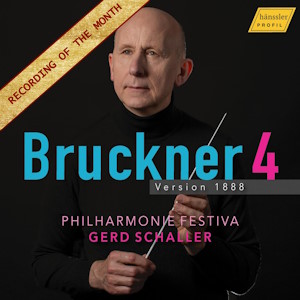
Anton Bruckner (1824-1896)
Symphony No. 4 in E-flat major ‘Romantic’(1888 version)
Philharmonie Festiva/Gerd Schaller
rec. live, 20 August 2023, former Cistercian abbey church, Ebrach, Germany
Profil PH23086 [59]
A year ago I favourably reviewed Markus Poschner’s recording of this last version of Bruckner’s Fourth Symphony in his own complete versions project; here is Gerd Schaller’s live recording of it as part of his own ongoing complete editions series. While many of Poschner’s recordings have been successful, some have been marred by excessive haste and I have found Maestro Schaller’s approach more consistently rewarding and agreeable.
The recorded acoustic here is broad. I have always found the sound engineering in this series to be ideal, in that just enough of the resonance inherent in recording in the Abteikirche is retained, lending Bruckner’s music its full weight and a resonant nobility; the opening horn call is properly balanced against the shimmering orchestral sound and individual instrumental strands come through clearly. Schaller’s grip over the full arc of first movement’s eighteen minutes is masterly; an underlying tension and momentum are always present, even in the lyrical interludes. Special kudos is due to the principal horn, whose smooth, golden tone, despite this being a live performance, never once falters during the many and frequent demands made upon his virtuosity. Indeed, the absurdity of any casual dismissal of the Philharmonie Festiva orchestra here as some kind of “pick-up band” is amply demonstrated by the sensitivity, coherence and sonorousness of their playing; as the notes tell us, these are “exceptional musicians from a number of Germany’s top orchestra” – especially the four principal Munich orchestras.
The Andante is delicate and wistful, the pizzicato accompaniment to the yearning melody first for cellos, then woodwind, then brass, is beautifully unanimous and dynamically subtle. As with the quieter passages in the first movement; there is always more than a hint of melancholy pervading the slow, rustic dance and the gradual ratcheting up of torque and volume beginning around eleven minutes into the movement triumphantly transmutes it into something far more elevated. I always feel that this is where Bruckner most approaches Mahler’s mystical relationship with Nature and the countryside and Schaller’s treatment of the music underlines that affinity. The Scherzo, here in the tauter, cut, later version is energetically despatched and the slight echo of the abbey location allows the hunting horn calls to assume a distant, dreamy character; the Trio is like a lazy siesta between the bursts of activity, the cuts to the reprise of the first theme rendering the fortissimo coda all the more explosive. The finale is massive and urgent, and again the reverberance enhances its epic quality; the playing of the Philharmonie is as grand and sweeping as one could wish and Schaller never lets the propulsion slacken, even during the more lyrical sections – which I think is right, given the movement’s length and the mercurial nature of its constantly changing moods and rhythms; it can too easily fragment if lingered over. The central chorale section is thrilling, the banks of brass blaring heavenwards, spilling out glorious, aureate tone and the peroration simply magnificent, not lamely cut off but fading away into the dome of the abbey.
I enjoyed Poschner’s account of this version of this last version of Bruckner’s Fourth but I think Gerd Schaller’s pips it in terms of energy, sonority and coherence; it is as fine a live, modern account as any I know.
Ralph Moore
If you purchase this recording using a link below, it generates revenue for MWI and helps us maintain free access to the site


.

















